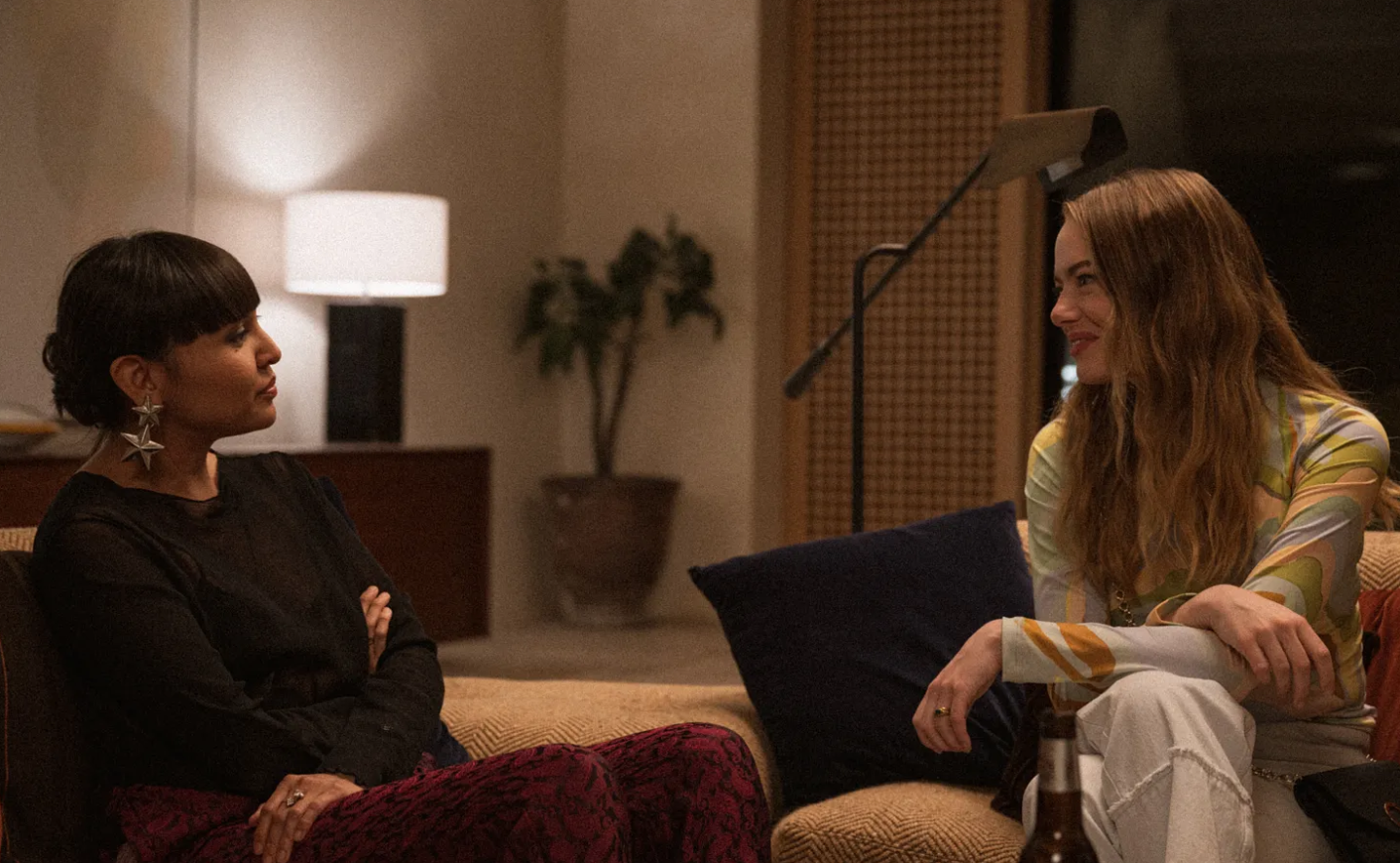An Ode to “Unlikeable Female Characters”
By Film and TV Editor Mia Tobin Power
It’s a bittersweet feeling, writing my last article as the Express Film and TV Editor. On the one hand, I’ve absolutely loved writing for the Express over these 12 issues, but on the other, I’m going to really miss getting to write 1400 words about whatever I wanted every fortnight. Throughout my time here, I’ve often focused on writing about feminist topics in film and TV, and I wanted to go back to those roots for this final article. Recently, I’ve been thinking about the idea of “unlikeable female characters”. This is a subject that’s become quite popular recently - Anna Bogutskaya even wrote a whole book about it. I think that when it’s used by well-meaning people, what this concept tries to do is the same thing I’ve tried to do throughout my time at the Express: draw attention to the potential of film and TV, and the female characters therein, to subvert and challenge patriarchal power and stereotypes.
From: The Curse created by Nathan Fielder and Benny Safdie.
I loved Nathan Fielder and Benny Safdie’s 2023 TV show The Curse. I thought it was criminally overlooked, especially in comparison to how much conversation there was around Fielder’s 2022 show The Rehearsal. I could write an entire article about its genius ending alone, but I think the show’s biggest success was its trio of central performances: Fielder, Safdie, and Emma Stone. I find it unbelievable that Stone’s masterful work in The Curse has barely been discussed. She plays Whitney Siegel, the rich daughter of “slum lord” parents, who wants nothing more to distance herself from her parents’ actions while using their money to fund her own projects. The show follows Whitney and her husband Asher as they make a HGTV show called Fliplanthropy in the town of Española. Whitney thinks of herself as both an architect and an artist, and Fliplanthropy revolves around her building “passive homes” for Española residents - or, more simply, gentrification. She’s essentially a critique of liberal white women who want to be seen - especially on social media - as “doing good”, without really thinking about the world around them and how their actions actually affect others. This character could easily be one-note and preachy, but Fielder and Safdie’s writing and Stone’s performance elevate Whitney into a complex - and definitely “unlikeable” - character, the kind of which we’ve never seen before. If Whitney was more “likeable”, The Curse would be a lot less interesting and enjoyable.
From: The Curse created by Nathan Fielder and Benny Safdie.
The foundation of Whitney’s character is her selfishness. She’s deeply concerned with both her self-image and her public image, but in the end, doing and getting what she wants matters more to her than either of those things. She’s entirely motivated by self-interest, as we see in one of my favourite storylines in the show. When Whitney sees that someone has been arrested for stealing from the jeans shop that she owns, she tells the shop’s employee that rather than calling the police on someone for stealing, she should instead charge Whitney’s credit card for the price of the stolen items. Whitney says that she doesn’t want to see someone’s future ruined by stealing something from her shop, but really, she doesn’t want to be seen as the reason their future is ruined, when she’s so focused on being perceived as a benevolent and generous force in Española. Of course, this scheme backfires when word gets around that anyone can steal from this shop. Whitney’s actions have the opposite effect of what she intended: she is accused of bringing crime to Española. Her desperate concern about her public image damages the community whose respect she’s trying to earn. But, as with her many other mistakes throughout the show, we understand her intentions, even when we think she’s foolish. Everything comes from a place that feels genuine, and because the writing and Stone’s performance are so successful, it all feels realistic. That’s one of the joys of an “unlikeable” female character: they so often feel like a real person.
One of Whitney’s worst traits, and one of the most excruciating and fascinating parts of The Curse, is how she exploits her “friendship” with Cara, a local Native American artist. Whitney is concerned about how it looks that she’s building her passive homes on the Pueblo people’s land, and she thinks that Cara will give her project an air of legitimacy - if a successful Native American artist endorses Whitney and her enterprise, then she must be doing something right. Cara doesn’t actually see Whitney as her friend - in reality, she barely tolerates her, while Whitney is willingly oblivious to Cara’s disdain for her and misunderstands Cara at almost every turn. Even though part of the appeal of “unlikeable” female characters is their freedom from moral standards and judgements, there’s a moral aspect to why Whitney is so compelling - we believe that she will get some kind of comeuppance for all her terrible actions throughout the show. But there’s also pleasure in the fact that no matter how immoral or “unlikeable” Whitney is, she’s nowhere near as irritating and awful as her husband Asher.
From: The Curse created by Nathan Fielder and Benny Safdie.
Many other shows would probably make Cara a perfect angel to counteract Whitney’s immorality, but luckily, Fielder and Safdie understand that wouldn’t be interesting. Cara is complicated and multi-dimensional too and feels even more like a real person than Whitney. I like how they suggest that there’s something off about Cara through her interest in Dougie, the sleazy, obnoxious Fliplanthropy director, who is constantly talking about his wife’s death in a car accident, the night he just happened to be above the legal blood alcohol limit. Cara also takes the money Whitney offers her to be a cultural consultant on her show - basically, to say that Whitney is a good person and has a positive effect on Española - although she does feel guilty about it. I find Cara so interesting because like Whitney, she’s largely self-interested - she goes along with Whitney’s actions when they can benefit her, but she’s always judging if Whitney’s white saviourism has gone too far for her to be associated with her any longer. In her performance, Nizhonniya Austin strikes the perfect balance between Cara’s self-preservation instincts and her conscience. I love that Cara’s not “nice”, and the show doesn’t expect her to be. Female characters are so much more interesting when they’re freed from the burden of being “nice” and allowed to be selfish.
To me, there are few characters who are a better case against the trap of “likeability” than Industry’s Harper Stern. No one would ever call Harper “nice”. She’s ruthlessly ambitious and will cut down anyone and everyone who stands in the way of her getting what she wants. She starts off the show as one of a group of young people enrolled in the grad programme at the bank Pierpoint and Co., and quickly marks herself out as the smartest and most talented of them all (she’s the protagonist of the show for a reason). What’s so great about Harper is that she’s maybe too clever for her own good. Since she takes big risks, she inevitably makes big mistakes too. In almost every episode, she makes a seemingly catastrophic mistake that will have you cringing and stressed for her. And yet, each time, she makes it out, and continues to rise through the ranks of the industry.
From: The Industry created by Mickey Down and Konrad Kay.
A favourite moment of mine is when Harper deliberately misleads a trader on her desk, causing him to lose the company a lot of money, so that her client will benefit from his loss. It’s a sneaky and underhanded thing for her to do, and she ends up losing her colleagues’ respect (though only temporarily, because they need her, after all). But it makes for such compelling TV. Myha’la’s performance is so captivating that I feel bad for Harper even when she’s understandably faced with the consequences of her own actions - I just want her to get away with everything. I love watching her in the process of becoming, making mistakes and learning and getting through by the skin of her teeth while managing to make so much money and bring in the biggest clients. I think that Harper is the perfect example of why we should move away from the idea that female characters need to be “nice” and “likeable” - she’s certainly not those things, but you’re constantly rooting for her to get everything she wants. I love to see a female character succeed because of her ruthlessness and ambition. Why should we worry about her morality when she’s so fun to watch?
As the idea of “unlikeable female characters” becomes more popular, I’m glad to see more characters like these three deeply complex women on-screen. A character is so much more captivating when they’re allowed to act like a real person, which naturally means being “unlikeable”. There’s a catharsis that comes from watching these characters act selfishly or unwisely, because in doing so, they’re subverting societal expectations for how women should behave. Creating “unlikeable” female characters also encourages us to get away from moral judgements of female characters, which is a flat and uninspired way to engage with a text. But above all, they’re just so fun to watch.
From: The Industry created by Mickey Down and Konrad Kay.






